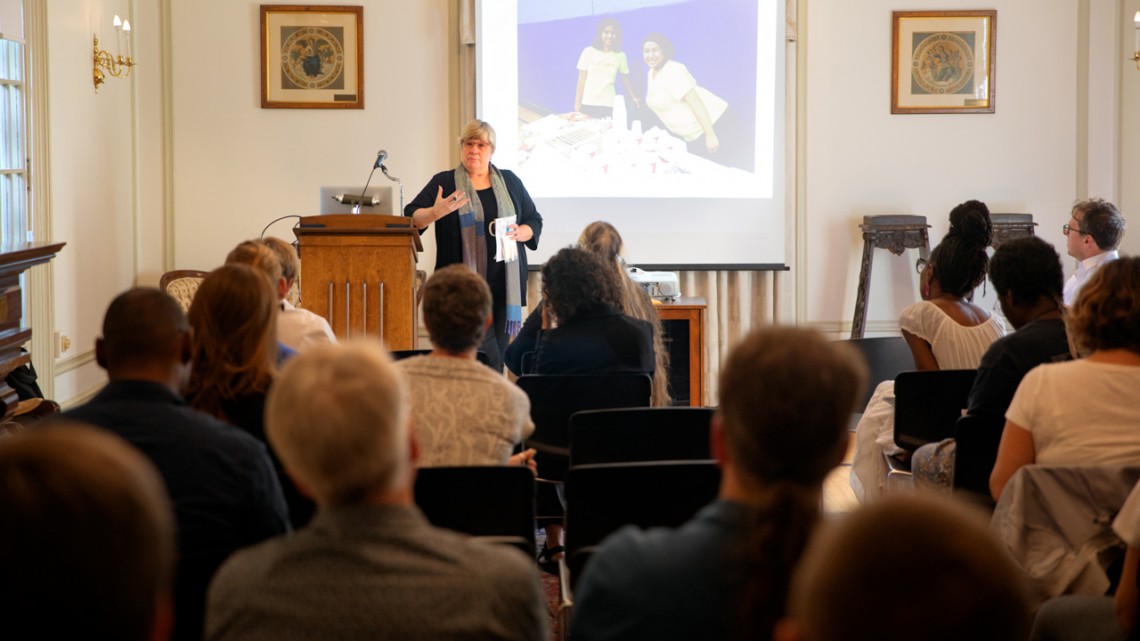
Poetry and performance, as well as more traditional presentations, comprised the first Rural Humanities Showcase, held Sept. 6 in the A.D. White House.
The nine projects represented Cornell faculty engagement, teaching and research around “rural humanities” – using the tools of the humanities to address both the rural-urban divide and the realities of rural America, particularly in central and western New York.
In addition to supporting new projects, the four-year Andrew W. Mellon Foundation-funded Rural Humanities initiative in the College of Arts and Sciences also aims to enhance the already existing projects at Cornell, such as those presented at the showcase, and form them into a visible program.
Rural Humanities is “an experiment in expanding the reach of the humanities at Cornell,” Paul Fleming, co-director of the initiative, said in his introduction. Fleming is professor of German studies and comparative literature and the Taylor Family Director of the Society for the Humanities.
“We want to encourage public and engaged projects,” Fleming said, “work which ranges from public-facing scholarship to directly collaborating with community partners in the co-creation of research and teaching agendas.” Those partners, he said, include the History Center in Tompkins County, local libraries, community colleges and indigenous communities.
The initiative offers a spring seminar and a summer practicum for graduate students and advanced undergraduates, as well as support for faculty outreach in generating new scholarship, said Gerard Aching, Rural Humanities co-director and professor of Africana and Romance studies.
The presentations included a dramatic reading of a scene from “The Next Storm: A Community-Based Play About the Impact of Climate Change on the Finger Lakes.” The project, a collaboration with the Civic Ensemble theater company of Ithaca,is led by Sara Warner, a Stephen H. Weiss Junior Fellow and associate professor of performing and media arts (PMA); Godfrey Simmons Jr., senior lecturer in PMA; and Toby Ault, associate professor of earth and atmospheric sciences in the College of Agriculture and Life Sciences. The actors included Cornell students and Ithaca community members.
Poet Lyrae Van Clief-Stefanon, associate professor of English, shared poetry by artists from Appalachia, where her current project, “Thriving Artists in Appalachia: Teaching at Hindman, Witnessing at Berea,” is focused.
Other presentations included:
- “Reflections on Collaboration with Haudenosaunee Communities: The Townley-Read and White Springs Projects” – Kurt Jordan, associate professor of anthropology and director of the Cornell Institute of Archaeology and Materials Studies;
- “Time and Histories in the Rural NE: Radiocarbon, Tree-Rings and Post-Colonial Timeframes and Historical Syntheses 1500 to 1900” – Sturt Manning, the Goldwin Smith Professor of Classical Archaeology and director of the Cornell Tree Ring Laboratory;
- “Rediscovering and Reconstructing the ‘People’s College’ Ideal” – Scott Peters, professor of development sociology in the College of Agriculture and Life Sciences;
- “Civic Storytelling in Rural Communities” – Jon McKenzie, professor of the practice in the Department of English, and Gretchen Rymarchyk, extension associate for the New York State Rural Schools Program, and deputy executive director for the Rural Schools Association of New York State;
- “Latinx Culture Collaborations in our Community” – Debra Castillo, a Stephen H. Weiss Presidential Fellow, Emerson Hinchliff Professor of Hispanic Studies in the Department of Comparative Literature and director of the Latina/o Studies Program;
- “Why Care About Undocumented Farmworkers?” – Mary Jo Dudley, director of the Cornell Farmworker Program; and
- “Community College Collaboration” – Caroline Levine, the David and Kathleen Ryan Professor of Humanities and chair of English; Anndrea Mathers, Tompkins Cortland Community College; and Christian Sisack, Onondaga Community College.
Read a full version of this story on the College of Arts and Sciences website.


